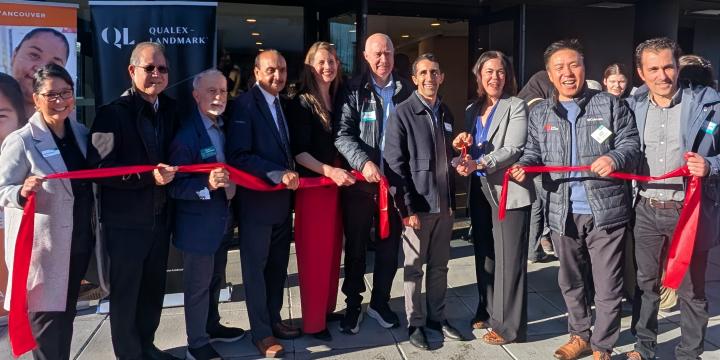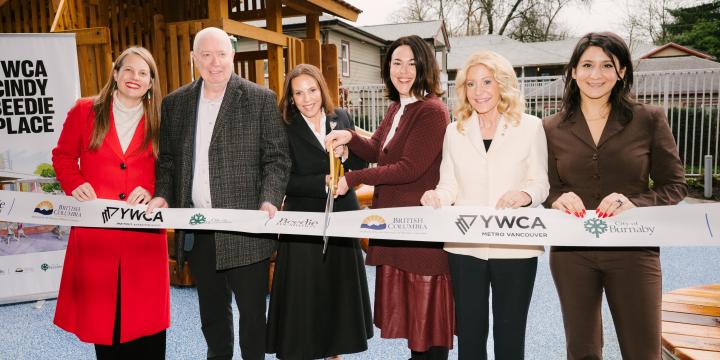
YWCA Metro Vancouver's Submission to the BC Budget 2021 Consultation
YWCA Metro Vancouver's Submission to the Select Standing Committee on Finance and Government Services
SUMMARY OF ISSUES AND RECOMMENDATIONS
This submission outlines key issues impacting YWCA clients, with an enhanced focus on the social and economic disruptions resulting from COVID-19. These recommendations are based on front-line experience, research and the advice of partner organizations regarding:
- Poverty and inequality
- Early learning and child care
- Legal supports and services
- Safe, affordable housing
- The charitable and non-profit sector
- Gender equity and COVID-19
We highlight six recommendations:
- Increase social assistance rates to reduce family poverty
- Invest in early learning and child care
- Increase funding for legal aid and supports for women leaving abuse
- Invest in affordable housing for low-income families
- Support the non-profit and charitable sector with a stabilization fund
- Apply a Gender-based Analysis Plus (GBA+) approach to pandemic recovery spending, informed by a diversity of voices
POVERTY AND INEQUALITY
YWCA Metro Vancouver congratulates the BC government for their commitment to implement a poverty reduction strategy with legislated targets and timelines. We were pleased to see Budget 2020 increased the monthly earnings exemption for families on temporary assistance, and we anticipate the new BC Child Opportunity Benefit will greatly assist families upon implementation later this year. However, these positive measures do not replace the need for immediate and significant increases to income and disability assistance.
Women and children are particularly impacted by poverty and inequality. Just 20% of children in BC are from single-parent families yet they make up more than half of children living in poverty.1 Of these single-parent families, 85% are headed by a single mother.2 In addition to significant increases to income supports, our recommendations include several measures to support single parents and low-income women through training and employment supports.
Recommendations:
- Provide immediate significant increases to income supports, including income assistance and disability rates, and index them to inflation.
- End the clawbacks of earned income from those on income and disability assistance to allow people to retain as much income as possible.
- Expand the Single Parent Employment Initiative to other groups, including immigrants, persons with disabilities and youth. Create flexibility within the program to ensure those who are benefitting have access to self-employment supports.
- Create supports and training for single parents to expand self-employment opportunities.
- Support access to technology for single parents and low-income individuals to enhance skills and employability.
- Create long-term training opportunities for individuals on income assistance to enhance employability and encourage labour market attachment.
EARLY LEARNING AND CHILD CARE
YWCA Metro Vancouver commends the provincial government’s investment toward a quality, affordable child care system through Child Care BC and we urge you not to lose momentum. As B.C. completes the third year of a 10-year plan to implement a quality, accessible and affordable child care system, we urge the province to identify and protect the funds for the remaining years of the plan with a goal of full implementation within that timeframe.
Finding and paying for child care is an enormous obstacle and stressor for BC families, the burden of which falls disproportionately on women. The lack of accessible, affordable child care is keeping parents, especially women, out of the workforce or from upwardly advancing their careers and incomes. This directly increases the gender pay gap and prevents progress toward gender equity in our province.
BC’s post-pandemic economic recovery depends on building a quality, affordable child care system with fairly compensated early childhood educators. With a reliable system in place, parents can return to work and redistribute more of their income back into the economy, families can leave income assistance, businesses are bolstered with employable prime-age applicants and the BC economy benefits from nearly 70,000 new jobs.
Our recommendations are consistent with the broadly-supported and evidence-based $10aDay Child Care Plan.
Recommendations:
- Begin moving all currently licensed child care programs to $10 a day child care sites, with no fees for families earning under $45,000/year.
- Implement a competitive province-wide wage grid for early childhood educators. We entered the pandemic with a critical shortage of early childhood educators due to a low median wage of about $20/hour. Implementing a competitive provincial wage grid will ensure BC has the educators needed to restart the economy. Raising median wages will also support gender equity across the province, as the child care sector is mostly comprised of women.
- Expand public child care spaces through infrastructure investments. With only enough licensed spaces for about 20% of young children in BC, Budget 2021 must include an updated three-year plan with funding to firmly instate quality, affordable child care.
- Build a durable governance structure for child care. BC’s patchwork of isolated child care programs has resulted in high levels of operational fragility and no guarantee that programs exist where they are most needed. Transition from stand-alone programs to a durable governance structure that prioritizes public and community-run programs.
ACCESS TO LEGAL AID AND SERVICES
Access to justice should be a right, not a privilege for those who can afford it.
We were pleased to see that Budget 2020 provided additional funding over three years to improve timely access to justice and the quality of services, including improving Indigenous peoples’ experience with the legal system. This new funding included $57 million for legal aid services and $8 million towards an Indigenous justice strategy. However, legal aid is still chronically underfunded.
Since 2002, legal aid in British Columbia has undergone drastic cuts. Women are particularly impacted by the cuts to family law legal aid, and gender equity in this province has suffered as a result. This can be life-threatening for the women we serve, particularly for those fleeing intimate partner violence. We have seen an increase in intimate partner violence due to COVID-19, and the need for legal support. Without access to the justice system, women risk being driven further into poverty, victimized or losing custody of their children.
Recommendations:
- Restore legal aid funding to pre-2002 levels, indexed for inflation.
- Invest in mandatory domestic violence training for judges and lawyers and explore other measures to support a trauma-informed experience for domestic violence survivors accessing the court system.
- Engage in robust, systematic, longitudinal collection of data with respect to outcomes for women survivors of intimate partner violence accessing Family Justice Access Centres.
HOUSING
YWCA Metro Vancouver applauds the provincial government’s $7 billion investment over 10 years to support housing affordability, including the Women’s Transition Housing Fund of $734 million to build and operate 1,500 new housing units for women.
The need for safe, affordable housing in Metro Vancouver has never been more critical. According to a 2019 report by the Canadian Centre for Policy Alternatives, not one of Metro Vancouver’s 70 neighbourhoods support a minimum wage earner, the majority of whom are women, to rent a one-bedroom apartment.3 For single mothers requiring two- or three-bedroom homes, market housing is completely out of reach.
Single mothers and their children live with the ongoing risk of being pushed out of the rental housing market. Recent data shows that 37% of single mother-led families do not have affordable housing and are less likely than their male counterparts to be able to afford their housing.4 Single mothers living in poverty also contend with multiple, complex barriers as they struggle to find child care and pay for transportation, food, health care and other necessities.
YWCA Metro Vancouver operates 12 housing communities and houses 611 single mothers and children, while managing lengthy waiting lists for these spots. As of June 2020, there are more than 2,000 single mothers waiting for YWCA long-term housing and 79 for transition housing.
We urge the BC government to address the housing crisis in Metro Vancouver by ramping up investment in affordable rental housing stock.
Recommendations:
-
Commit to an ambitious build-out program of 10,000 new units of non-market rental housing annually in order to address Metro Vancouver’s ongoing housing crisis.
BC NON-PROFIT AND CHARITABLE SECTOR
BC’s non-profit sector is vast in size, scope and impact. It provides more than 86,000 jobs and generates $6.4 billion towards our provincial GDP.5 According to a new report about the impacts of COVID-19 on BC’s non-profit sector, 40% of non-profits anticipate service disruption and 74% anticipate reduced revenue from fundraising. One in five non-profits have closed or anticipate closing due to financial shortfalls brought on by the pandemic.
Organizations like YWCA Metro Vancouver deliver programs and services that improve the social determinants of health for women and families who face intersecting oppressions. This includes responding to increases in gender-based violence, supporting women and children with safe, affordable housing, improving food security for low-income families, providing emergency child care and maintaining a flexible response to community needs throughout the pandemic.
BC relies on the non-profit and charitable sector to support people and community in areas the government is unable to address. Our economic recovery depends on a robust and responsive charitable sector and our governments can and should invest in a long-term stabilization framework.
Recommendation:
-
Provide a targeted stabilization fund to ensure the long-term stability of the sector. This fund should be developed in partnership with the sector and apply a Gender-Based Analysis Plus (GBA+) approach.
GENDER EQUITY AND COVID-19
The COVID-19 pandemic has and will continue to have a disproportionate impact on women. This deepens for poor women, racialized women, Indigenous women, disabled women, senior women and 2SLGBTQIA+ women. An approach to emergency response and recovery planning that is gender-responsive, and that considers these intersecting and overlapping layers of discrimination, is necessary to reach those most impacted and those most vulnerable.
YWCA Metro Vancouver appreciates the quick and decisive response from government to flow support to the broad community. However, the fragility of our social infrastructure, the inbuilt biases and inequities and the enormous holes in our safety net have been revealed by the pandemic.
Poverty in BC is gendered and COVID-19 is deepening it. Given that women are concentrated in jobs and sectors hardest hit by COVID-19 and make up most part-time and minimum wage workers, we are extremely concerned about the period when supports and subsidies come to an end.
Recommendations:
- Apply Gender-Based Analysis Plus (GBA+) approach to public policy and spending related to pandemic recovery in BC, informed by a diversity of voices.
- Engage women, women-led organizations and equity-seeking groups as a part of recovery planning.
- Provide stable and substantial funding for non-profit and charitable organizations through a targeted stabilization fund. This fund should be developed in partnership with the sector and apply GBA+ approach.
ABOUT YWCA METRO VANCOUVER
Established in 1897, YWCA Metro Vancouver's mission is to touch lives and help women and their families build bright futures through advocacy and integrated services. One of the largest and most diversified non-profit organizations in the province, the YWCA focuses on supporting a person’s path to economic independence, wellness and safety.
The YWCA's vision is to achieve women's equality. In order to make strides toward that goal, the organization focuses on housing, early learning and child care, youth education and development, mentorship, employment, food programs, single mothers’ support, violence prevention and advocacy. The YWCA operates several social enterprises to financially support programs, including a hotel and a health and fitness centre, and has also established a strong network of donor and government funding.
Much of the YWCA’s services are offered to women living on low incomes, Indigenous women, newcomer and refugee women, senior women and single mothers and their children. In 2019, 48,572 people accessed the YWCA through 66 programs in 75 locations across Metro Vancouver.

